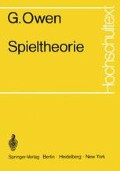Zusammenfassung
In den vier vorangegangenen Kapiteln wurde stillschweigend angenommen, daß zwei Spieler entgegengesetzte Interessen haben. Diese Annahme ist jedoch nicht immer sinnvoll, da sogar in einem abgeschlossenen System, in dem der eine genau das gewinnt, was der andere verliert, das Interesse der Spieler nicht unbedingt entgegengesetzt sein muß. Wenn nämlich der eine Spieler ein reicher Philantrop und der andere ein armer Mann ist, könnte es sein, daß der erste Spieler den zweiten gewinnen läßt. Man sollte demnach in einem solchen Fall nicht das Geld, sondern den Nutzen, der allerdings manchmal durch Geld gemessen wird, als Auszahlung betrachten. Nicht-monetäre (sagen wir ideelle) Gründe könnten ein Spiel für einen Spieler sehr wertvoll, für einen anderen wertlos machen. Es muß also das Konzept des persönlichen Wertes, oder besser des persönlichen Nutzens erörtert werden.
Access this chapter
Tax calculation will be finalised at checkout
Purchases are for personal use only
Preview
Unable to display preview. Download preview PDF.
Kapitel VI
ARROW, K.J.: Social Choice and Individual Values, Cowlen Commission Monograph 12. New York: John Wiley and Sons, Inc. 1951.
DAVIDSON, D., SIEGEL, S., SUPPES, P.: Some Experiments and Related Theory on the Measurement of Utility and Subjective Probability, Applied Mathematics and Statistics Laboraty, Technical Report 1, Stanford University, 1955.
HAUSNER, M.: Multi-Dimensional Utilities, Decision Processes, ed. Thrall, Coombs, and Davis. New York: John Wiley and Sons, Inc. 1954.
HERNSTEIN, J.N., MILNOR, J.: An Axiomatic Approach to Measurable Utility, Econometrica 21, S.291–297 (1953).
ISBELL, J.: Absolute Games, Annals 40.
LUCE, R.D.: A Prohabilistic Theory of Utility, Technical Report 14, Behavioral Models Project, Columbia University, 1956.
SUPPES, P., WINET, M.: An Axiomatization of Utility Based on the Notion of Utility Differences, Man. Sci. 1, S.259–270 (1955).
Author information
Authors and Affiliations
Rights and permissions
Copyright information
© 1968 W. B. Saunders Company
About this chapter
Cite this chapter
Owen, G. (1968). Nutzentheorie. In: Spieltheorie. Hochschultext. Springer, Berlin, Heidelberg. https://doi.org/10.1007/978-3-642-65244-8_6
Download citation
DOI: https://doi.org/10.1007/978-3-642-65244-8_6
Publisher Name: Springer, Berlin, Heidelberg
Print ISBN: 978-3-540-05498-6
Online ISBN: 978-3-642-65244-8
eBook Packages: Springer Book Archive

